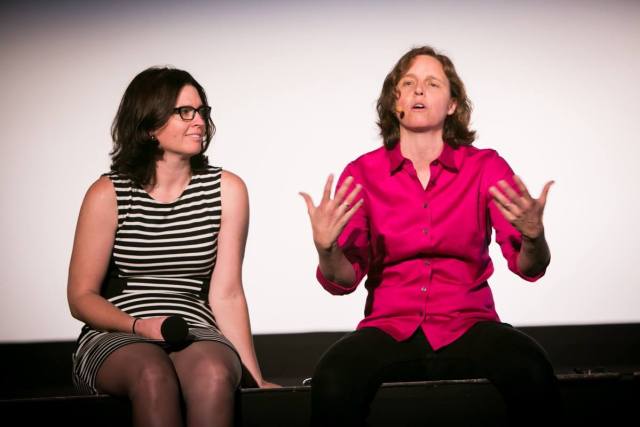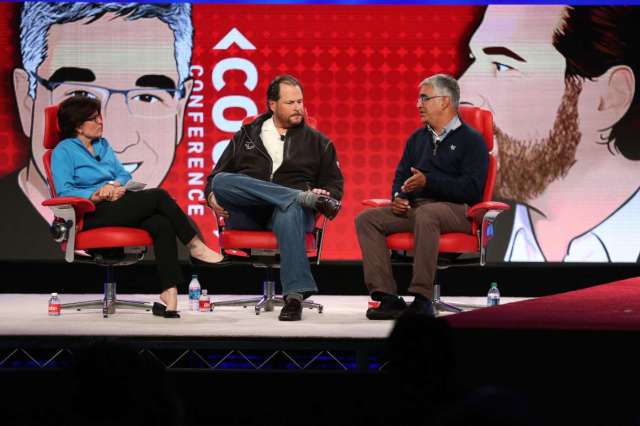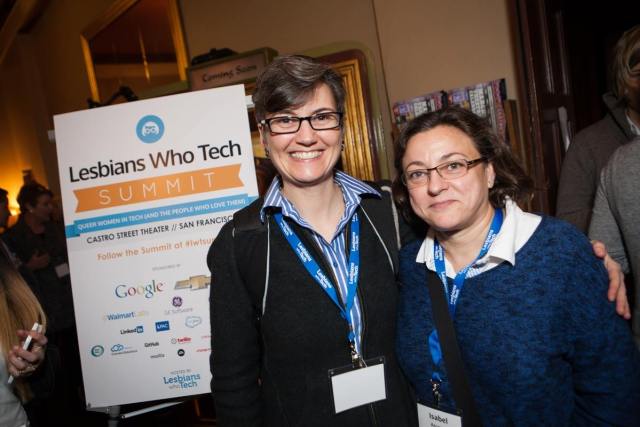
feature image courtesy LWT and Nikki Ritcher Photography
Lesbians Who Tech began two years ago as a way for queer women in the industry to get together. When they hosted their first annual summit at the Castro Theater in San Francisco the excitement was palpable, the possibilities endless. As someone who expected a couple hundred attendees and was overwhelmed to find myself in a sea of nearly 800, I would have to say it was a great success. But it wasn’t numbers alone. There were incredible keynotes by Megan Smith, formerly of Google[x], now the nation’s Chief Technology Officer; startup pitches that blew us away such as one for a new dating app we’re likely all familiar with now, Dattch; and a host of well-attended activities, learning lunches, a Hackathon and more. Tech Editor Ali Osworth wrote a recap that paints a pretty picture of the almost overwhelmingly positive inaugural event.

Pittsford with Smith at last year’s summit Feb 28, 2014 in San Francisco, CA. Nikki Ritcher Photography.
LWT is run mainly by one woman, Leanne Pittsford, and she knows she has a lot of diverse people to please, a lot to live up to. So it’s understandable why she’d want to choose a very prominent figure for the top of her year two ticket. But when that announcement came, amidst the frenzy of tech news that came out of CES earlier this month, that this person would be Marc Benioff, it was met with some consternation. Why would Pittsford choose a straight white cis man to be the face of LWT 2.0? I sat down with her last week to get some answers on that and what new things to expect this year.
Without a formal press release, the news of Benioff’s keynote circulated through a brief email to previous attendees without fully spelling out its intent. Pittsford was quick to note that for the main event they wanted the speakers to be almost exclusively women, primarily queer women, with Kara Swisher front and center. Swisher, Co-Executive Editor and Founder at Re/Code and former Wall Street Journal writer, is is journalistic powerhouse and agreed to return as a main speaker. But unlike last year’s more traditional keynote, the idea was to leverage Swisher’s place as a reporter to interview other influential people within the tech industry.
“We wanted to keep it women focused,” Pittsford explained, “because most tech conferences are mostly male and mostly white. We really take those things seriously. But for Kara’s interview, she’s obviously an out lesbian, we thought about it in a more open way. What if we just keep this open in terms of the best tech leader we can get, gay or straight, male or female, as long as they’re an ally…Part of the reason we picked [Benioff] is to have a larger conversation around diversity in the technology sector.”
In this way, it seemed that Swisher was a part of choosing Benioff, although when we reached out to her she responded that she was not. In subsequent communications Pittsford clarified that she made the decision herself though she emphasized that it was “…based on dozens of conversations with our stakeholders, committee members, advisors and tech influencers.”
Clearly, however, Pittsford and other organizers expect Swisher to push the conversation towards the tough questions we want to see answered. In choosing this specific combo, Pittsford aims to get one of the most powerful men in Silicon Valley to not only think critically about diversity, but to put these thoughts to action. “It’s a conversation we have to have with the people who have the most power in the space,” she says, “I get the con side of it and it’s a decision I didn’t take lightly.” This I interpret to mean that the choice to put Benioff in front of 800+ queer women isn’t so much to hear him speak to us, but to give us the chance to speak to him. Pulling someone in like Marc Benioff, she explains, is “moving the conversation forward.”

Swisher and Benioff (Left and Center) have shared a stage before. Photo courtesy Re/Code.
So who is Marc Benioff and what does he have to say about diversity? As the chairman and CEO of Salesforce, Benioff is known not only as one of Silicon Valley’s most successful businessmen, but also one of its biggest leaders in philanthropy. Fortune Magazine named Salesforce as the World’s Most Admired Company in the software industry two years in a row, and ranked the company #7 among the World’s Best Places to Work. I personally know several LGBT employees who are pleased with their company’s policies and are generally happy in their jobs, and employee satisfaction seems to be high on their list of priorities. To further exemplify his good guy cred, in 2000 Benioff launched the Salesforce Foundation and established the “1-1-1 model,” whereby the company contributes one percent of product, one percent of equity, and one percent of employee hours back to the communities it serves globally. Certainly, Benioff has been a leader and a positive force in the Bay Area, but it’s a little harder to pinpoint what he has done or wants to do for and with the queer community.
Perhaps for the summit, however, recognition will go a long way to helping LWT become a respected conference and ultimately help participants in making more meaningful connections and encourage more diversity in hiring. But it must be more than a numbers game. Attendance is already high for the small Castro Theater, where most of the main event takes place. The lines for both theater bathrooms were often quite formidable and yet Pittsford’s assertion that they were able to make jokes about it because people “made a lot of great connections in line” rings true. She expects even more attendees this year. So much so that this year even more local businesses have been drafted for additional space.
Moving to an an impersonal hotel or conference space would lose some of the “magic” of hundreds of queer women descending upon the Castro and Pittsford was keen on keeping the feeling of intimacy even in expanding. So nearby bars and restaurants have been rented out, which will be turned into themed lounges and smaller workshop spaces. Some of these new aspects will also be the most anticipated. They’re looking for a “SXSW feel” and a way to delve deeper into specific subjects. There will be Women in Tech lounge, Biotech, Cyber Security and Hacker lounges in addition to specific Saturday workshop tracks in professional development, coaching, media training and more. A big Saturday night party for the whole LGBT community might even loosen a few ties. I love the idea of keeping some of our more gritty gay roots in this networking arena; that way I don’t feel bad when I go into a meet and greet with a second drink in my hand. Because there’ll be enough for everyone to have two drinks this, year right?
I do believe that there are other ways LWT might want to expand, and perhaps prominent speakers can help this happen, though I had hoped for a slightly clearer vision of what this would look like. I could surmise that the idea is to get more sponsorships, more money, perhaps more ability to offer scholarships; but this was never confirmed as a goal. What I did hear was, “I want to see more men there. We had very little male representation and sometimes it is our allies who need to hear [our experiences]…If I could have a hundred more people [who didn’t get it before attending the summit] that’s what it’s all about.” But should that be what LWT is about? Surely we do want some space for allies, for men and straight people to get it, to see us in action. But if we need to show them a man on stage in order to get that, I wonder how much they will truly be informed or have the “aha moment” Pittsford strives to see.
The argument that it will get people in the door who have never considered diversity to listen to a talk on that topic specific, however, is not without merit. “Every civil rights movement has depended on allies to move forward and while we wouldn’t ever focus on our entire conference on allies, having a straight, white, tech leader like Marc Benioff show up and support our conference is a big step forward,” Pittsford asserts. And I agree that is important to have allies in powerful places even as I would argue that it is not enough to simply claim to be an ally without creating change directly.
It will be a challenge, also, to balance a 101 level diversity training that might make sense to such individuals with a more nuanced approach that won’t alienate the base, those of us who already intimately know the struggles of what it is like to be LGBT, female or otherwise marginalized within technology. Our hope that this is possible comes from the skill of interviewer and fellow keynote Kara Swisher. Pittsford has left this entirely in her (incredibly capable) hands, so while we have no actual idea of the thesis of their talk or the direction their conversation will take, we can only trust that Swisher’s brilliance in technology journalism translates to thought-provoking questions, insightful commentary and positive solutions when talking diversity.
Ultimately, the only way we will be able to judge the success of the Benioff/Swisher dual keynote will be to watch it and engage on a critical level. I look forward to doing so Friday Feb 27th in the Castro. See you there?
[Editors note: Ali here. After this interview, we also got the excellent news that Megan Smith will be returning to LWT to join in during the keynote portion of the day. Megan Smith is the Chief Technology Officer of the U.S.A., helped teach President Obama to code and is the highest ranking lesbian government official in the country. We hear they’ll be honoring her at the conference as well — a must-see moment in Lesbians Who Tech history.]
This has been the one-hundred-sixteenth installment of Queer Your Tech with Fun, Autostraddle’s nerdy tech column. Not everything we cover is queer per se, but we talk about customizing this awesome technology you’ve got. Having it our way, expressing our appy selves just like we do with our identities. Here we can talk about anything from app recommendations to choosing a wireless printer to web sites you have to favorite to any other fun shit we can do with technology. Header by Rory Midhani.




White Man is the best candidate to talk about [topic]? Quelle surprise…
If a concern at Lesbians Who Tech is to be educational for male “allies”, have a specific workshop geared towards that, don’t turn the keynote speaker into a damned teaching moment for allies. jfc
Yeah I have to admit I still have a fair amount of skepticism in my soul. Will certainly be giving an post conference breakdown
Yes, exactly. Pittsford’s explanation actually makes me even less comfortable with this decision. From the quotes here it seems like there’s way too much concern for getting taken seriously by men to be considered legitimate.
Forgive me but I don’t understand why you are uncomfortable with the decision to have ONE man from the tech industry involved with this event. For as long as I’ve been following LWT, I was always under the impression that friends and allies were welcome. It’s not like the Denver Broncos are gonna rock up and start chanting anti-lesbian songs.
Glad to read a bit more clarification. I was definitely one of the many very confused opinions regarding his purpose as a cis white male at this event.
I got a scholarship ticket – see you there!
If the idea is to get him to listen to us, I wonder if (a) he knows that’s the plan (b) if he would actually listen or would he take up space.
I think it’s a good move. God help him though, when do you think he was last outnumbered in a room by really smart women? :-)
Leanne, if you read this, please make the video available on the LWT YouTube as I couldn’t afford to come to this years summit.
Working on it! Email me at [email protected]